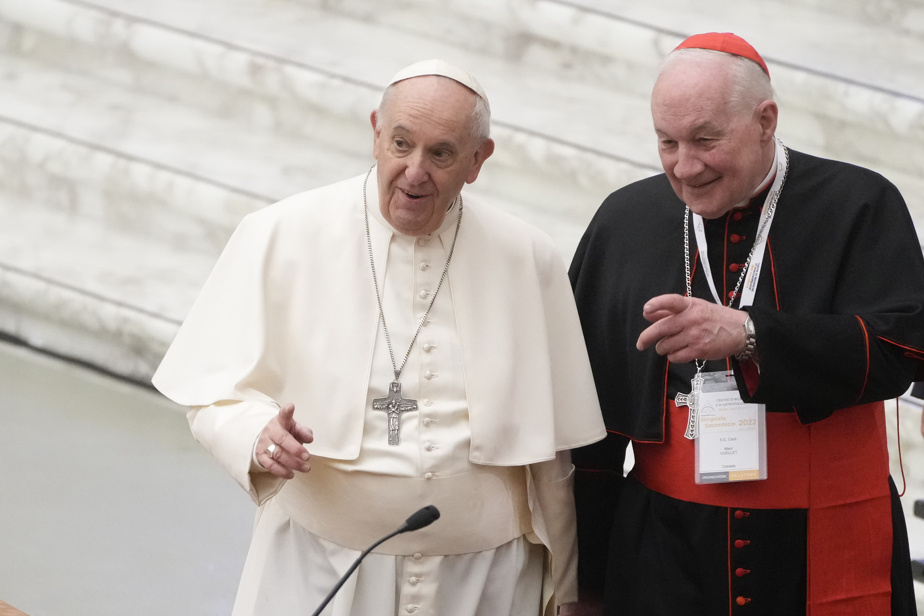On April 12, Quebec Cardinal Marc Ouellet will officially cease to lead the Congregation for Bishops. Under his leadership, the Canadian episcopate became more conservative.
“The bishops appointed in the last decade were ordained priests under John Paul II, and represent a more conservative generation,” says Michael Coren, an Anglican priest from Toronto who just published The Rebel Christ and was until recently Catholic. “We speak less of Marc Ouellet in English Canada than in Quebec, but he certainly continued this conservative trend. »
Thomas Reese, a Jesuit who teaches at Santa Clara University in California, believes that Bishop Ouellet’s bishop appointments have undermined Pope Francis’ plan to fight “clericalism” in the Church. “Francis wants an open Church,” says Father Reese. But very often the bishops appointed in the last decade defend the institution of the Church against the world, instead of serving the faithful. »
The same trend is observed in Quebec, according to Marie-Andrée Roy, sociologist of religions at UQAM.
The bishops appointed after Francis’ election as pope in 2013 are different from those chosen between 2010, when Bishop Ouellet took office in the Congregation for Bishops, and 2013. “We see a difference especially in the last years , because when François arrived, there were a lot of appointment processes that had already begun,” said Gilles Routhier, theologian at Laval University.
According to Mr. Routhier, one of the representative appointments of Bishop Ouellet under Benedict XVI is that of Christian Lépine, Archbishop of Montreal since 2012, hailed by the anti-abortion movement and denounced by women’s groups. That of Martin Laliberté, a former missionary, in 2021 in Trois-Rivières would be representative of the appointments of Bishop Ouellet under François.
Marc Ouellet himself was seen, when he was appointed bishop of Quebec in 2002, as a conservative who had come to bring the Quebec episcopate to order. It is therefore curious that the end of his career at the Vatican is marked by another appointment in a large diocese, which seems to mark a wind of change: the appointment of Montrealer Frank Leo in Toronto.
“I would say that the bishops of English Canada were all surprised to see that they weren’t chosen from among their ranks to lead the largest diocese in the country,” says Darren Dias, a Dominican who teaches at the Toronto School of Theology. .
Carl O’Byrne, coordinator at Inclusive Ministries, a Jesuit organization that serves the spiritual needs of sexual diversity, is hopeful that Bishop Leo will prove less conservative than his predecessor, Thomas Collins. “In an interview he gave before his appointment, he was talking about the Lumen Gentium document of Paul VI [pope from 1963 to 1978],” says Mr. O’Byrne. Generally, it is believed that Lumen Gentium sees the Church as serving the people. »
Marie-Andrée Roy is less optimistic about Bishop Leo: when he was secretary general of the Canadian Conference of Catholic Bishops, he had bad relations with nuns. “And there is a lot in the cult of the Virgin Mary, notes Ms. Roy. The more one loves Virgo, the more one distrusts ordinary women. To me, he’s a hyperconservative. »
The timing of Archbishop Leo’s appointment is also surprising: it came two weeks after Bishop Ouellet’s resignation was announced last January. “The process of appointing a bishop involves lengthy consultations, so it is impossible that the appointment of Bishop Leo was decided on a whim,” Fr. Dias said. But his appointment could very well have been announced later, to avoid making the link between the two events. »
Mr. O’Byrne also finds the near-simultaneity of the announcements of Archbishop Leo’s appointment and Bishop Ouellet’s resignation strange. “Bishop Ouellet’s resignation didn’t take effect until April, so it appears these announcements were made in close proximity intentionally,” O’Byrne said. It supports the thesis that the appointment of Archbishop Leo is a message to the Canadian episcopate that the future belongs to different, less conservative bishops. »
If Archbishop Leo turns out to be less conservative than his Canadian colleagues, his appointment could mirror Bishop Ouellet’s appointment to Quebec in 2002, according to Laval University’s Routhier: Bishop Ouellet was a conservative who came to rein in an overly progressive episcopate, while Archbishop Leo contrasts with an episcopate deemed too conservative by Pope Francis. “We have to see how Archbishop Leo will act as bishop, but the parallel is interesting,” Routhier said.

